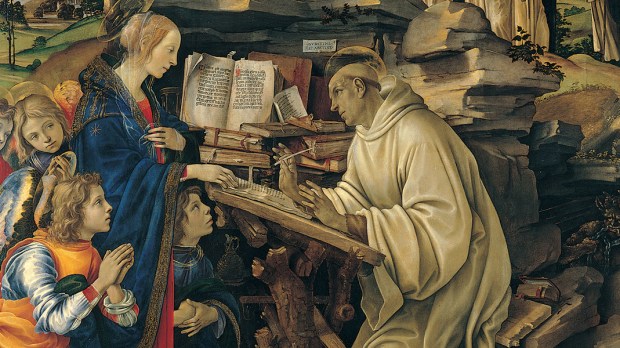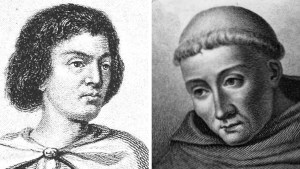Today we remember and honor St. Bernard of Clairvaux, a great theologian, abbot, and doctor of the Church. He was very famous during his lifetime, but today he is much less well-known. Yet the more we learn about his life, the more we see that this brilliant and holy man can teach us so much today.
St. Bernard is a somewhat controversial figure owing to his vocal support of the Second Crusade and his sharp-tongued condemnation of those he considered heretics. Certainly some of what he did and said was problematic, both today and by the standards of his own time. So let’s turn our focus instead to the positive, meaningful lessons that can be gleaned from his life.
He may have lived a millennium ago, but he faced issues very similar to the ones we ourselves confront. Human nature remains the same over the centuries, even as society and technology have changed so much. You might be surprised to find out how much you have in common with a 12th-century Cistercian monk!
These are three lessons that the modern Christian can learn from the life of St. Bernard of Clairvaux.
1“Let your light shine before men”
In Scripture, Christ urges his followers to be a light for the world, saying,
You are the light of the world. A city set on a mountain cannot be hidden. Nor do they light a lamp and then put it under a bushel basket; it is set on a lampstand, where it gives light to all in the house. Just so, your light must shine before others, that they may see your good deeds and glorify your heavenly Father. (Matthew 5:14-16)
What would it look like if we truly “let our light shine” on the world? What effect would it have on the people around us?
One answer to this question lies in an extraordinary incident from St. Bernard’s life. He discerned a vocation to the Benedictine order at a young age. But when he entered the monastery, he didn’t only give his own life to God. He brought 30 other men with him!
Bernard being Bernard, with all the force of his mind and personality, when he knocked on the door of the abbey, he was not alone. Behind him at the door stood a long train of 30 of his brothers, cousins, and friends, all noblemen. Bernard was the leader. They were the followers. They wanted to become monks because he wanted to become a monk. When he asked, they answered, and they answered “Yes.” This natural gift to command and lead was a sign of things to come.
We can only imagine what he must have said or done to convince almost every young man he knew to follow him into the monastery! His witness is such an example to the rest of us. How can we live as witnesses to the goodness of the Gospel? How can we act so as to bring those around us to Christ?
2Don’t push yourself past your breaking point
When St. Bernard started his own monastery at Clairvaux, he was only 24 years old. He began his life there with great youthful zeal, but he took it a little too far. The severe penances he imposed began to harm his health.
At the urging of his friends and superiors, he was obliged to reduce his penances:
The beginnings of Clairvaux were trying and painful. The regime was so austere that Bernard’s health was impaired by it, and only the influence of his friend William of Champeaux and the authority of the General Chapter could make him mitigate his austerities.
Self-care is a trendy buzzword right now, but there is a lot of truth to the idea behind it, which is that we can’t run ourselves into the ground or we will burn out completely. There can be too much of a good thing, even of penances and devotions! St. Bernard’s early experiences at Clairvaux remind us not to overdo it in our own lives, so that we can have the energy we need to serve God and others.
This comes with a big caveat, however. St. Bernard had to slow down because he was pushing himself too hard, but after he reduced his penances, he continued to give his very best to God. The lesson here isn’t that we shouldn’t push ourselves: We should do the absolute best we can! Instead, it’s that we need to know where the limit is and not go past that point.
3Pray first, act second
During his own lifetime, St. Bernard saw one of his own disciples ascend to the papacy. He took this opportunity to give wise and important advice, which many of the popes have appreciated over the centuries since then:
Bernard saw one of his disciples, Bernard of Pisa, Abbot of Three Fountains, and known thereafter as Eugenius III, raised to the Chair of St. Peter. Bernard sent him, at his own request, various instructions which compose the “Book of Consideration,” the predominating idea of which is that the reformation of the Church ought to commence with the sanctity of the head. Temporal matters are merely accessories; the principal are piety, meditation, or consideration, which ought to precede action. The book contains a most beautiful page on the papacy, and has always been greatly esteemed by the sovereign pontiffs, many of whom used it for their ordinary reading.
This idea that meditation and consideration must precede action was written for a pope, but is relevant to all of us. How much more effective will we be if we ask God for his help and guidance before we undertake a task?
St. Bernard reminds us that prayer must always be the first and most important step, not an optional extra. Let’s take this advice to heart and see how it can transform our daily lives.



